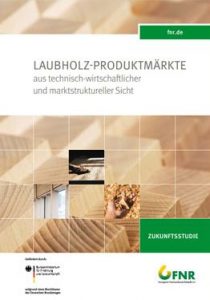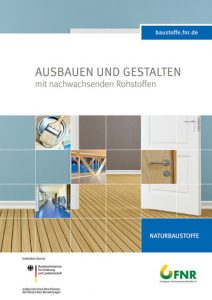
A study funded by the Federal Ministry of Agriculture determined the potential of hardwood as a substitute for coniferous wood. The results of the study are now available in a brochure published by the Fachagentur Nachwachsende Rohstoffe e. V. (FNR). There is considerable potential for hardwood to be used in industrial timber, but it cannot yet be a substitute for softwood in construction.
Already today, almost twice as much hardwood is provided in Germany as 20 years ago. Beech and oak are the dominant deciduous tree species with a share of 70 %. In wood use, there is considerable potential for using the accumulating hardwood industrial wood as a material. These potentials for low-priced wood assortments lie in particular in the production of wood-based materials such as chipboard or fibreboard. Higher-quality hardwood assortments are suitable, among other things, for windows and exterior doors, solid parquet flooring, interior fittings, solid wood panels and in exterior applications.
Potentials in wood-based materials and interior design
However, the study also makes clear that hardwood can only replace softwood to a limited extent. The timber industry with the key use of building with wood is dependent on softwood. The available hardwood cannot substitute softwood in comparable quantities for technical and economic reasons. The large number of species in hardwood with their widely differing properties makes standardisation difficult. Moreover, processing is usually technically more complex and causes higher costs.
More courage and innovation needed
In order to further develop the potential of hardwood use, the authors recommend, among other things, that companies be more courageous and innovative in establishing and expanding manufacturing processes specialized in hardwood use. In addition, sales-promoting industry communication and marketing for domestic hardwood are crucial for buyer behaviour.
The brochure "Hardwood product markets from a technical-economic and market structure perspective" is available in the Media Library available.
Background:
A conversion of forests towards more deciduous forests has been taking place in Germany since the 1990s. In particular, beech and oak trees are being planted in the spruce or pine forests. This is intended to make the forests not only more natural but also more stable against external influences such as storms and drought as well as climate change. As a result of the forest conversion, more hardwood will be available as a renewable raw material in the future.
The brochure is based on the BMEL-funded research project "Market potentials of hardwood products from a technical-economic and market-structural point of view - hardwood product markets" by PD Dr. Marcus Knauf, Bielefeld, with the assistance of Prof. Dr. Arno Frühwald, Reinbek.
The research project identified market potentials for products made of hardwood. Product areas in which hardwood is competitive with softwood or can complement softwood were analysed. The analyses were based on official statistics, published market studies, literature, the authors' own experience and interviews with experts. The final report is available at fnr.de under the funding code 22023214 available.
The FNR has been active as a project management agency of the BMEL for the funding programme Renewable Resources since 1993. It also supports research topics in the fields of sustainable forestry and innovative wood use.
Source: FNR-PM from 15.09.2020
Keywords: Building materials / Construction, DE-News, Research, Wood construction, Sustainable management, New books and studies




